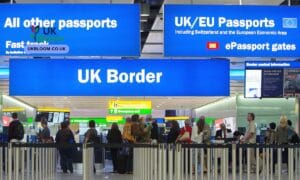At UKBloom, we understand how deeply global politics and trade agreements can shape your journey as a newcomer to the UK. One of the most frequently asked questions by our readers recently is: “What does the UK-India trade deal mean for migrants, especially students, workers, and families moving to the UK?”
The recent negotiations between the United Kingdom and India have taken significant steps forward, marking a new chapter in bilateral relations. From easier access to skilled jobs to smoother visa pathways and academic collaboration, this trade deal carries major implications for anyone considering a move from India to the UK.
In this article, we’ll unpack what the recent UK-India trade deal involves, its key benefits, and how it may affect various groups—from international students to skilled professionals and entrepreneurs.
Understanding the UK-India Free Trade Agreement (FTA)
The UK-India Free Trade Agreement (FTA) has been in the works since 2022, with multiple negotiation rounds addressing complex issues like tariffs, services, mobility, and intellectual property. The primary aim? To boost trade and investment between the fifth- and sixth-largest economies in the world.
Key Objectives of the Trade Deal:
- Eliminate or reduce tariffs on goods and services
- Open up both markets for investment and talent mobility
- Streamline customs processes
- Strengthen educational and research collaboration
- Encourage bilateral growth in technology, pharmaceuticals, and clean energy sectors
According to UK Government updates, this agreement could increase UK-India trade by up to £28 billion annually by 2035.
What the Trade Deal Means for Indian Migrants and UK-Bound Workers
The UK-India FTA goes beyond goods and trade—it covers people-to-people movement, too. Here’s how:
1. Easier Mobility for Skilled Workers
One of the most anticipated provisions of the deal is the improved mobility of professionals between the two countries. For Indian nationals looking to work in the UK, this could lead to:
- Simplified visa processes under schemes like the Skilled Worker visa
- Increased employer demand in tech, healthcare, and engineering sectors
- Potential recognition of Indian qualifications in the UK
This opens the door for thousands of Indian workers seeking high-skilled job roles, especially in sectors facing shortages.
✅ Tip: Use our [Dependent Eligibility Calculator] and [Skilled Worker Visa Guide] to check which jobs and salary levels qualify you for UK migration.
2. Greater Opportunities for Students
The trade deal aims to enhance educational cooperation between UK and Indian institutions. This benefits Indian students through:
- Increased scholarships and academic exchange programs
- Easier post-study work options under the Graduate Visa route
- Possibility of recognised Indian degrees being accepted in the UK
The UK has already welcomed over 140,000 Indian students in recent years—a number expected to rise with this deal.
✅ Explore our [UK University Finder Tool] to compare courses, tuition fees, and student visa routes.
3. Support for Entrepreneurs and Start-ups
Indian business owners and start-up founders may find the UK a more accessible market. The FTA is expected to:
- Lower barriers to market entry for Indian companies
- Create investment opportunities in fintech, AI, and renewable energy
- Ease immigration pathways for business visitors and investors
This aligns with the UK’s Global Talent and Innovator Founder routes, attracting innovation-led professionals from India.
Industry Sectors Most Likely to Benefit
The trade deal isn’t just political—it’s practical. If you’re considering a career move to the UK, here are sectors expected to benefit directly:
✔ Technology and IT
With the UK keen to fill tech shortages, Indian IT professionals may experience:
- Streamlined visa sponsorship
- Better recognition of tech qualifications
- Access to innovation clusters in London, Manchester, and Birmingham
✔ Healthcare
India has long been a vital source of healthcare workers for the UK. This deal could mean:
- Continued recruitment of Indian nurses, doctors, and carers
- Fast-tracked approvals for medical staff
- Recognition of Indian medical training
✔ Education and Research
Joint research ventures and more cross-border academic partnerships could arise, offering:
- Faculty exchange opportunities
- Research grants and academic fellowships
- Access to UK research institutions and labs
Implications for UK Immigration Policies
While the FTA does not replace UK immigration rules, it will likely influence future visa policies. Here’s what to watch for:
- Bilateral Youth Mobility Schemes: Easier short-term work rights for young people aged 18–30
- Professional Mobility Pathways: Dedicated visa quotas for highly skilled professionals
- Education Migration Flexibility: Quicker student visa processing and clearer post-study options
Currently, there is no automatic visa route under the FTA, but it lays the groundwork for relaxed immigration pathways between the two nations.
Real-World Example: What This Could Look Like
Let’s say you’re a 28-year-old software engineer from Bengaluru with a UK job offer. Under this new trade context:
- Your employer may find it easier to sponsor you
- Your Indian degree might be recognised without additional validation
- You could bring dependants more easily, with shorter processing times
Or, if you’re a student pursuing a Master’s degree in the UK:
- You may benefit from reduced fees or new scholarship opportunities
- You’ll have a clearer post-graduation route to gain UK work experience
Related Tools & Resources from UKBloom
- [Skilled Worker Visa Points Calculator]
- [UK Cost of Living Calculator for Students & Workers]
- [Graduate Visa Guide: Stay in the UK After Studies]
External Resources
FAQs About the Recent UK-India Trade Deal
What is the UK-India trade deal about?
The UK-India trade deal aims to strengthen economic ties by reducing tariffs, improving market access, and enhancing professional mobility between both nations.
Will the trade deal create new visa routes for Indian workers?
While no specific visa route has been created yet, the deal sets the stage for easier migration through existing routes like the Skilled Worker and Graduate visas.
How will this affect Indian students in the UK?
Students may benefit from increased scholarship programs, mutual degree recognition, and better post-study work opportunities.
Are Indian businesses getting easier access to UK markets?
Yes, Indian companies and entrepreneurs may find reduced barriers to entry, smoother business travel rules, and stronger IP protection.
When will the trade deal take full effect?
Although much of the framework is agreed, the finalised trade deal is expected to be signed by late 2025 or early 2026.
Conclusion
The recent UK-India trade deal represents more than just an economic agreement—it’s a potential lifeline for Indian professionals, students, and entrepreneurs who aspire to build a life in the UK. With a friendlier immigration outlook, stronger educational ties, and more job opportunities on the horizon, now is a great time to explore your options.
At UKBloom, we’re here to help you navigate each step—from choosing the right visa to settling into life in the UK confidently and successfully.
Disclaimer:
This article is for informational purposes only and does not constitute legal or immigration advice. Please refer to official UK government sources or seek legal support for specific guidance.






